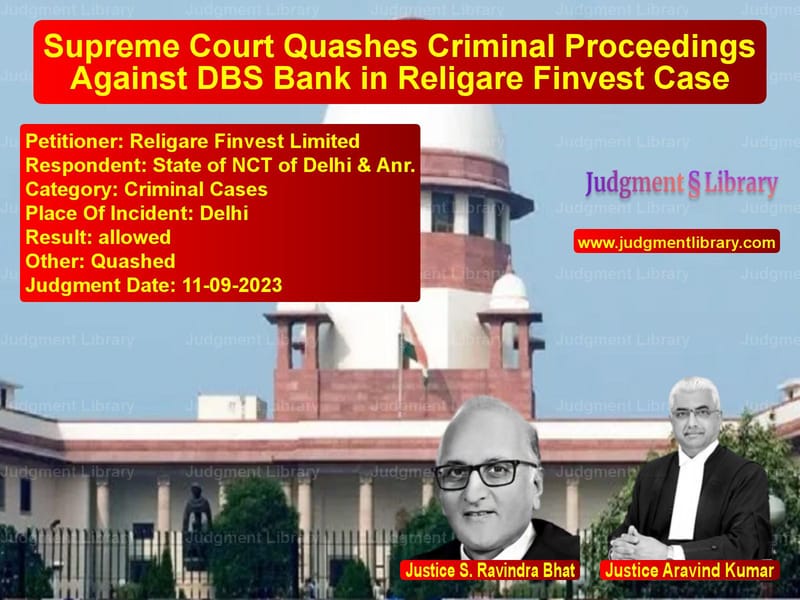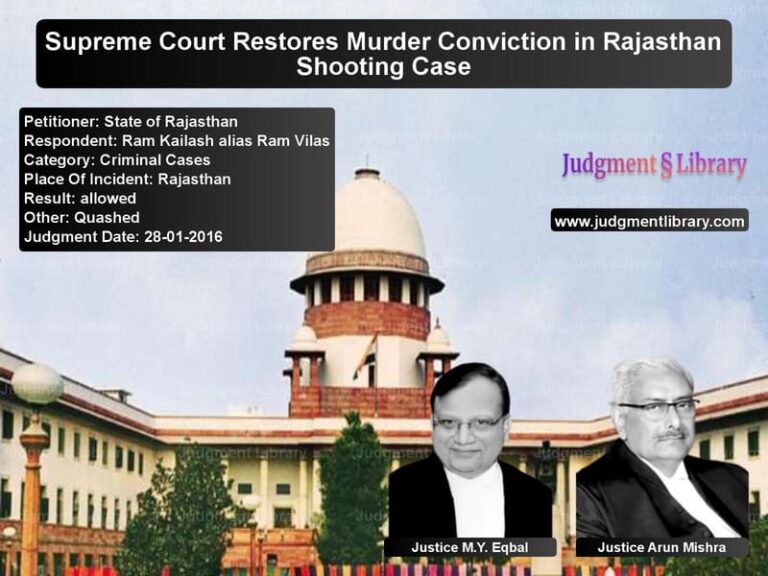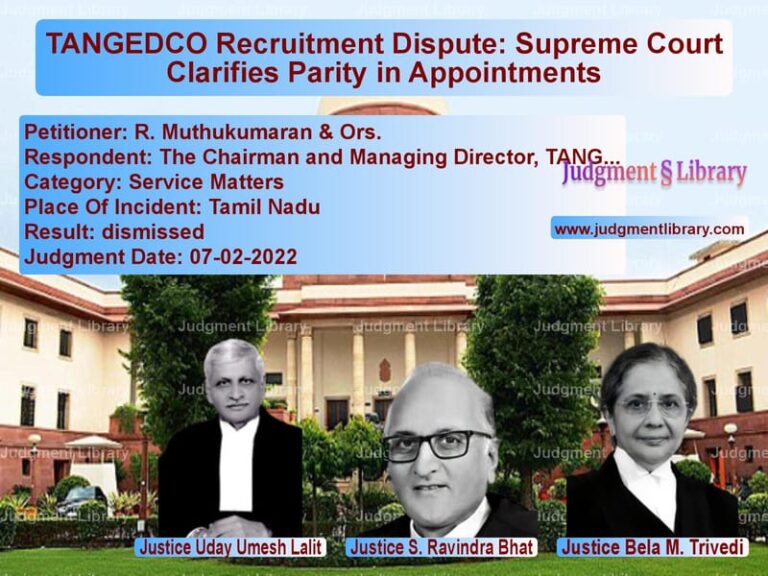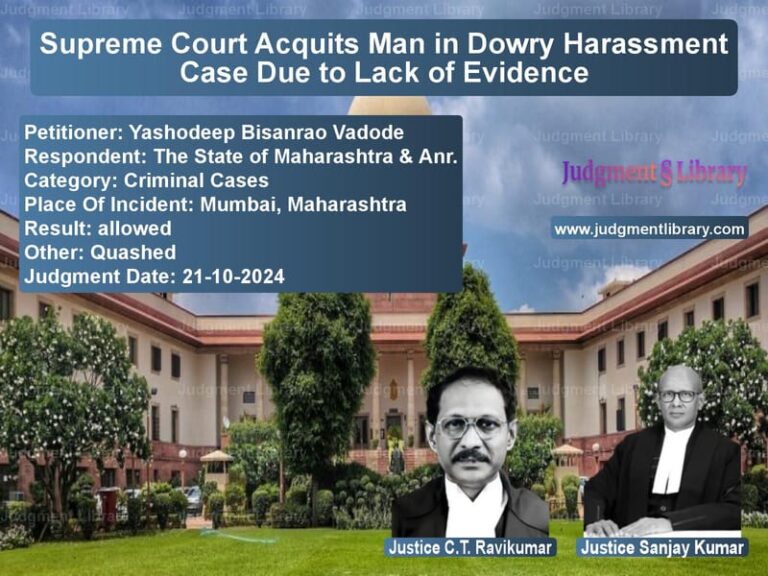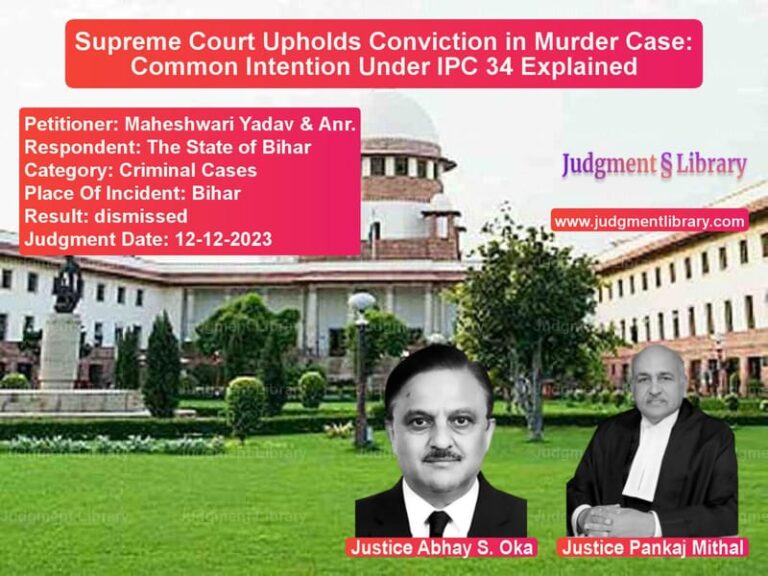Supreme Court Quashes Criminal Proceedings Against DBS Bank in Religare Finvest Case
The Supreme Court of India, in a landmark judgment, has quashed criminal proceedings against DBS Bank in a case involving the alleged misappropriation of fixed deposits by the erstwhile Laxmi Vilas Bank (LVB). The case, Religare Finvest Limited v. State of NCT of Delhi & Anr., revolved around financial irregularities that took place before LVB’s non-voluntary amalgamation with DBS Bank.
Background of the Case
Religare Finvest Limited (RFL) filed a commercial suit against LVB, seeking recovery of ₹791 crores, alleging that the bank had misappropriated its fixed deposits. According to RFL, the bank extended loans to its group companies, RHC Holding Pvt. Ltd. and Ranchem Pvt. Ltd., without proper authorization, leading to financial losses. When these companies defaulted, LVB unilaterally adjusted ₹723.71 crores from RFL’s account.
On September 23, 2019, RFL lodged a criminal complaint, leading to the registration of an FIR by the Economic Offences Wing under Sections 409 (Criminal Breach of Trust) and 120B (Criminal Conspiracy) of the Indian Penal Code (IPC). A chargesheet was filed against ten officials of LVB, but the bank itself was not initially named as an accused.
However, in a supplementary chargesheet filed on February 12, 2021, LVB—by then merged with DBS Bank—was added as an accused. Summons were issued to DBS Bank on February 16, 2021, leading to legal challenges.
Legal Issues Before the Supreme Court
The Supreme Court had to determine:
- Whether DBS Bank could be held criminally liable for actions of LVB officials before the merger.
- Whether the criminal proceedings against DBS should be quashed given the provisions of the amalgamation scheme.
Arguments by Religare Finvest Limited
RFL, represented by senior counsel Rana Mukherjee, argued:
- The High Court erred by staying the summons issued to DBS Bank instead of outright rejecting its plea to quash the proceedings.
- Clause 3(3) of the amalgamation scheme allowed for the continuation of proceedings against LVB, meaning DBS, as the successor entity, should be held accountable.
- Criminal proceedings do not automatically abate upon a company’s amalgamation.
- DBS Bank, as the beneficiary of LVB’s assets, should also bear its liabilities.
Arguments by DBS Bank
DBS Bank, represented by senior counsel Mukul Rohatgi and Jayant Bhushan, countered:
- LVB ceased to exist upon amalgamation, and its liabilities could not be transferred to DBS unless explicitly mentioned in law.
- Only individuals directly responsible for criminal acts could be held liable, not a successor entity.
- The High Court’s decision to seek clarification from the Reserve Bank of India (RBI) on the scope of the merger was valid.
- DBS had no prior connection with LVB and should not be punished for the latter’s alleged misdeeds.
Supreme Court’s Analysis
The Court examined several legal precedents and statutory provisions to decide whether DBS could be prosecuted for the acts of LVB. Key findings included:
1. Effect of Amalgamation on Criminal Liability
The Court noted that when two companies merge, the transferor company (LVB) ceases to exist. Citing previous rulings, it emphasized that criminal liability does not automatically transfer to the successor entity unless expressly provided by law.
2. Clause 3(3) of the Amalgamation Scheme
The Court interpreted Clause 3(3) of the merger scheme, which stated that legal proceedings against the transferor bank would not abate. However, the proviso specifically limited this to proceedings against individuals like directors, officers, and employees. Since DBS Bank itself was not involved in the alleged misconduct, the Court ruled that it could not be prosecuted.
3. Corporate Criminal Liability
The Court reiterated that corporate criminal liability applies only when direct involvement or vicarious liability is established. Here, DBS had no role in the alleged financial irregularities, and holding it liable would set a dangerous precedent.
4. RBI’s Role and the High Court’s Order
The Court acknowledged the RBI’s clarification that criminal proceedings against the officials of LVB did not extend to DBS. It held that the High Court should have outright quashed the proceedings instead of seeking further clarification.
Supreme Court’s Judgment
The Supreme Court quashed the criminal proceedings against DBS Bank, stating:
“To permit prosecution of DBS for the acts of LVB officials would result in travesty of justice. Therefore, the pending criminal proceedings arising out of FIR – 189/2019 registered at P.S. Economic Offences Wing, New Delhi, to the extent it involves DBS, are hereby quashed.”
Additionally, the Court set aside the High Court’s order directing RBI to clarify the scope of the merger scheme.
Implications of the Judgment
This ruling has significant implications for corporate law and banking regulations:
- Protection for Acquiring Banks: Institutions acquiring distressed banks through government-mandated schemes will not be held criminally liable for past misconduct.
- Clarification on Corporate Criminal Liability: Successor entities will not automatically inherit criminal liability unless explicitly stated.
- Increased Accountability for Individuals: The judgment reinforces that individual wrongdoers, not corporations, should be held responsible for criminal acts.
Conclusion
The Supreme Court’s decision in this case is a landmark ruling in corporate criminal liability, ensuring that successor banks are not penalized for past misconduct of merged entities. By quashing proceedings against DBS Bank, the Court has reinforced the principle that liability must be tied to direct involvement, not mere corporate succession.
Petitioner Name: Religare Finvest Limited.Respondent Name: State of NCT of Delhi & Anr..Judgment By: Justice S. Ravindra Bhat, Justice Aravind Kumar.Place Of Incident: Delhi.Judgment Date: 11-09-2023.
Don’t miss out on the full details! Download the complete judgment in PDF format below and gain valuable insights instantly!
Download Judgment: religare-finvest-lim-vs-state-of-nct-of-delh-supreme-court-of-india-judgment-dated-11-09-2023.pdf
Directly Download Judgment: Directly download this Judgment
See all petitions in Fraud and Forgery
See all petitions in Money Laundering Cases
See all petitions in Judgment by S Ravindra Bhat
See all petitions in Judgment by Aravind Kumar
See all petitions in allowed
See all petitions in Quashed
See all petitions in supreme court of India judgments September 2023
See all petitions in 2023 judgments
See all posts in Criminal Cases Category
See all allowed petitions in Criminal Cases Category
See all Dismissed petitions in Criminal Cases Category
See all partially allowed petitions in Criminal Cases Category

